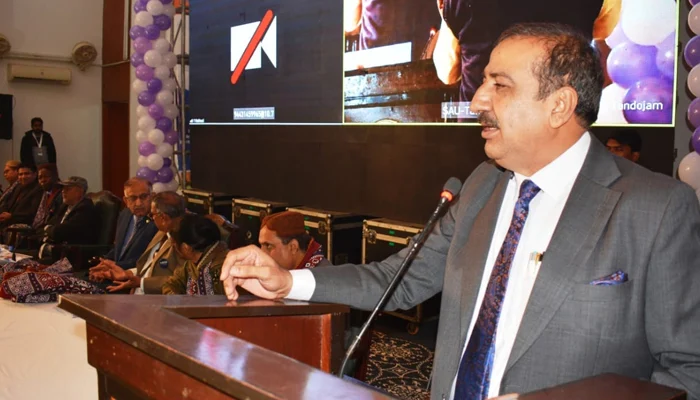Conference provided a platform for experts to discuss the crucial intersection of technology and humanitarian efforts, exploring ways to leverage innovation for societal betterment.

In a groundbreaking two-day International Humanitarian Technology Conference 2024 hosted by the Sindh Agriculture University (SAU) in Tandojam, national and international experts underscored the pivotal role of agricultural research support programs in driving developmental success.
The conference, organized by the Information Technology Centre (ITC) of SAU in collaboration with the Institute of Electrical & Electronics Engineers (IEEE) Karachi Section, delved into the transformative changes brought about by technology, emphasizing the indispensability of artificial intelligence (AI) and humanitarian technology for societal advancement.
SAU Vice Chancellor, Dr. Fateh Marri, emphasized how technology, particularly AI, has become a linchpin in various sectors, revolutionizing agriculture processes such as land leveling, farming, weather monitoring, water systems, livestock breeding, marketing, and GIS systems.
Dr. Marri asserted that encouraging private sector investment of Rs400 billion in agriculture could amplify research efforts, potentially resulting in a substantial annual production increase per acre. Such advancements, he suggested, could significantly boost the country’s GDP, potentially reducing poverty and unemployment by half.
Dr. SM Tariq Rafi, Chairman of the Sindh Higher Education Commission (SHEC) Karachi, highlighted SHEC’s commitment to supporting universities, faculties, and students through robust research support programs, including grants. While acknowledging Pakistan’s relative lag in production and research compared to developed nations, Dr. Rafi commended local institutions for their satisfactory achievements and stressed the importance of nurturing ideas and startups among students.
IEEE Karachi Section Chair, Prof. Dr. Bhawani Shankar Chowdhry, applauded the collaborative efforts of SAU in organizing the HTC, underscoring IEEE’s role in advancing technology for the benefit of humanity.
The conference delved into various technological domains, including agri-tech industry, artificial intelligence, big data, and industry 0.4.
A noteworthy keynote address titled “Data Security, Privacy and Cyber Policy of Pakistan: A Closer Look” was delivered by Dr. Lubna Luxmi Dhirani from the University of Limercik, Ireland. Her talk shed light on the critical issues surrounding data governance, privacy risks, and cyber policies in Pakistan. Dr. Dhirani emphasized the significance of United Nations Sustainable Development Goals (SDGs) 10 and 16 in addressing inequalities and protecting vulnerable populations from cybercrime.
The conference provided a platform for experts to discuss the crucial intersection of technology and humanitarian efforts, exploring ways to leverage innovation for societal betterment.
Prof. Dr. Asadullah Shah of the International Islamic University Malaysia highlighted the broader impact of technology on human life, citing OpenAI’s ChatGPT as a revolutionary force in language and translation capabilities. The conference also featured contributions from SAU Faculty of Agricultural Social Sciences Dean Dr. Aijaz Ali Khooharo, ITC Director Dr. Mir Sajjad Talpur, and Dr. Muhammad Yaqoob Koondhar, emphasizing the collaborative efforts needed to propel agricultural research and technology forward.
In the concluding ceremony, Engr Syed Abdul Qadir Shah, former Chairman Pakistan Science Foundation and President National Engineering Alliance (NEA), lauded Pakistan’s agricultural heritage and the potential for growth. He highlighted the transformative impact of the fusion of Internet of Things (IoT) and Artificial Intelligence (AI) in the agricultural landscape.
Engr Abdul Qadir Shah underscored the global phenomenon of integrating IoT in farming practices, enabling farmers to monitor real-time data on soil conditions, crop health, and weather patterns. He emphasized how AI, through predictive analysis, enhances decision-making processes, optimizing resource allocation and improving crop yields.
Expressing gratitude to visionary minds such as Dr. Fateh Mari, Prof Dr. Bhawani Shankar, and Dr. Tariq Soomro, Engr Abdul Qadir Shah acknowledged the resilient farmers of Pakistan for their dedication towards a future where technology, agriculture, and sustainability converge.
The two-day conference featured numerous parallel technical sessions, showcasing 139 papers from 21 countries. The diverse range of topics covered underscored the global importance of humanitarian technology and its potential to drive positive change.
As the conference concluded, the consensus was clear – a united effort to promote agricultural research support programs and harness the potential of AI and technology is paramount for achieving tangible and far-reaching benefits in societal development. The call to action resonates as a beacon for the future, pointing towards a harmonious synergy between technology and humanitarian endeavors.